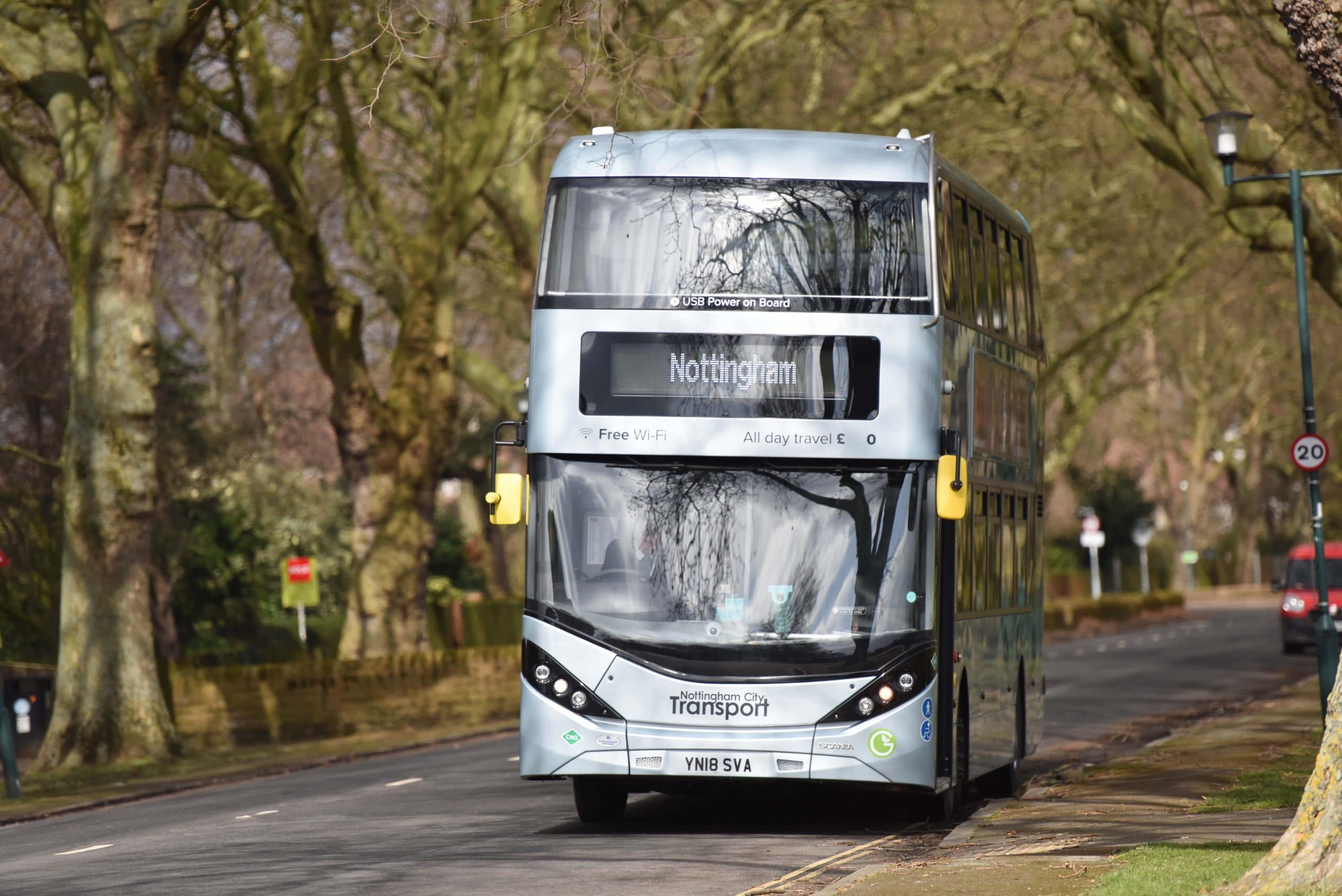Biogas buses have played a major role in helping NCT meet its clean air objectives and remove the need for a CAZ. routeone visited its depot to see why it was the right answer
Nottingham City Transport (NCT) and its biogas buses should be familiar to operators in alternative fuels circles.
In 2019 it more than doubled the size of its biogas-powered fleet and expanded its biomethane refuelling station to accommodate that growth.
By the end of the year NCT claimed to be running 120 biogas buses, one of the largest such fleets in Europe, and since 2015 all new double-decks have been the gas-powered Scania ADL Enviro400CBG model.
So, with the current focus on zero-emissions technology, why was gas the right answer for NCT?

Biogas buses offer a different approach
Nottingham was one of five cities outside London ordered to explore measures to introduce a mandatory Clean Air Zone (CAZ) by the government, demanding Euro VI compliance by 2020. But in 2018 Nottingham City Council reneged on plans for a CAZ and moved to an Air Quality Plan, citing several measures as helping meet air quality objectives. NCT’s fleet renewal was integral.
Between 2016 and 2018, NCT took delivery of 53 biogas double-deck buses alongside supporting fuelling infrastructure while fitting many vehicles in its Euro V diesel fleet with SCR exhaust treatment systems, bringing NOx emissions in line with Euro VI standards.
NCT made it clear at the time that any alternative low-emission fuel used at its Parliament Street depot must match the profile of diesel. Gas achieved that. It also achieved NCT’s objective of a 250-mile range on one filling and an immediate reduction in NOx emissions.

The right decision
NCT Engineering Director Gary Mason was one of the driving forces behind NCT’s move towards gas and biogas powered vehicles. Throughout his time working in the West Midlands he has seen the standard of tailpipe emissions improve radically and recognised the need to be creative in meeting air quality objectives.
“Achieving each improvement in Euro emissions standards was becoming increasingly difficult,” Gary explains. “To gain the reductions in NOx and particulate matter that were required was going to be challenging for a diesel engine, owing to complicated engine design and exhaust treatment systems.”
NCT was not sceptical about diesel when it began to look at alternatives, but Gary says it made sense to look at what the firm’s options were moving forward. Gas has won out in several areas.
“We did a lot of work with Scania, which was our partner in supplying double-deck buses,” he explains. “We knew Euro VI was coming and the main thrust of our fleet replacement was going to be double-decks. Scania didn’t have a gas double-decker at the time but was a prominent supplier of single-deck gas buses in the UK and Europe and was keen to develop a gas-powered double-deck.”
The first round of low carbon bus funding through the Office for Low Emission Vehicles kick-started NCT’s move into gas with a £1.12m investment. That provided a contribution towards the infrastructure and incremental cost of the vehicles.
In line with NCC’s Air Quality Plan, NCT is renewing more of the fleet to meet Euro VI standards. This has also involved retrofit of its diesel buses in partnership with Baumot.
With a batch of nearly 80 vehicles at Euro III or IV and of an age that did not justify retrofit, fleet renewal was pulled forward. Last year a further 67 gas double-decks were procured bringing the total number to 120, while 180 Euro V buses were retrofitted by the end of 2019.

Clean and green
Several factors are continuing to drive gas forward as the predominant fuel at NCT. “We want to be as green as we can, not just as clean as we can,” explains Gary. “The best way to do that, in our view, is by using a gas engine that we can then power with a renewable biofuel. In this case, biomethane.”
Like many in the industry, Gary believes a range of technologies will be what contributes to a sustainable future. Gas will play a pivotal role for NCT, as its fleet replacement plans fit into the 2028 net zero carbon target set by NCC. After 2021, NCT will be replacing the last of its OEM Euro V diesel buses with, according to Gary, “as close to carbon neutral” vehicles as it can. But more is required to achieve net zero targets.
“Anything is achievable with enough push from central government,” says Gary. “The push is not going to be just for cleaner buses; it has to be a step change in transport. One of these will be the move from private journeys to public transport. Most public transport journeys in the UK are done by bus and I can’t see that changing.
“It’s the most flexible means of public transport and modal shift isn’t going to happen on its own – there has to be strategy from central government.”

Gary also promotes the production of more renewable fuels, such as biomethane. Domestic food waste is an untapped potential as feed stock for anaerobic digesters. Increasing the availability of biomethane would encourage demand for gas powered vehicles.
And as NCT has proven, back-to-base fleets lend themselves perfectly to biogas.
All that is needed is a supply, and a commercial incentive.



























